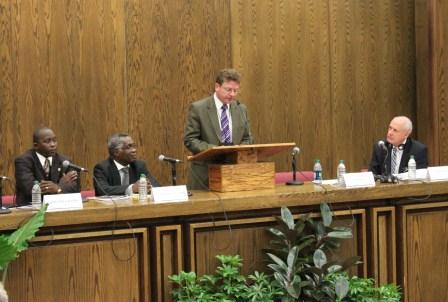Africa: Ghana, Liberia, and South Africa

Brent Andrus, Regional Research Advisor for Africa
E.K. Quansah – Mountcrest University College; Accra, Ghana
Title: Religion, Democracy and Civil Society: The Case of “Witches” in Ghana
Religion plays a significant role in politics and society in most African nations and blends easily with politics. In Ghana, religious freedom is openly encouraged by the government. However, the practice of witchcraft is a serious issue. Yet, ironically, witchcraft is commonly encouraged by pastors of small, charismatic churches. It is common during calamities, such as the death of a child, for a scapegoat to be identified, often an aged or infirm female. The evidence against the accused is totally subjective. Innocence or guilt may be determined during a trial by cutting off the head of a chicken, tossing the chicken into the air and seeing how it lands.
Typical treatment of convicted witches are beatings, lynching’s or banishments to one of 6 witches’ camps in the north of the country. There is no legal basis for these camps and such practice is highly discouraged by the government. Chapter 5 of Ghana’s 1992 Constitution provides protection of religious freedom and witchcraft is considered a violation of the law. At a recent conference in Ghana the issue was strongly spoken out against by a high government official. However, enforcement of witchcraft law is very lax. This stems from the fact that witchcraft is indigenous to historical cultural norms in Ghana. In addition to enforcement of the law prohibiting witch trials, education of the Ghanaian people is considered essential as a means of discouraging such practices.
Counsellor Jallah A.Barbu – Law Reform Commission of Liberia
Title: Liberia’s Religious Democracy and Hidden Conflicts
Liberia was originally founded as a resettlement for former slaves. It won its independence in 1847 and blazed new ground by being the first African nation to elect a female president. Only recently did the country free itself from a long period of civil war. These wars have been political, not religious. Liberia promotes religious freedom in general, but recognizes Christianity as preeminent. There is no state religion and no one denomination is favored over another.
Yet, by giving special treatment to Christianity, discrimination against Islam has been an unintended consequence. For example, Muslims are permitted to run for public office, yet rarely elected. There have been some positive steps lately, such as the formation of an interfaith council that includes Muslims along with Christians. Also, appointments of Muslims to public is not uncommon. These positive trends allowed Muslims to play an active role, alongside Christians, in negotiating and end to the recent civil war.
A new religious conflict is emerging in Liberia not related to Islam but rather small Christian sects. They originate from the born-again movement and are considered by other Christian denominations in Liberia as “half Christian. These start-up churches are not recognized by the government, and therefore not by the citizens.
Professor Shaun Alberto de Freitas, Associate Professor and Departmental Chairperson, Department of Constitutional Law and Philosophy of Law, University of the Free State, South Africa
Report forthcoming